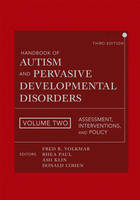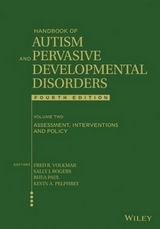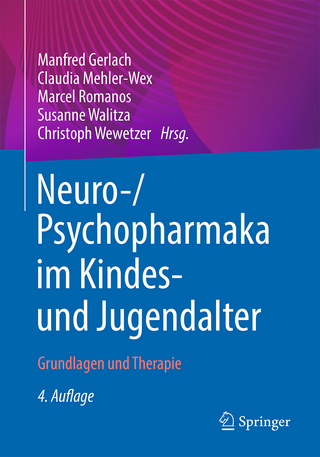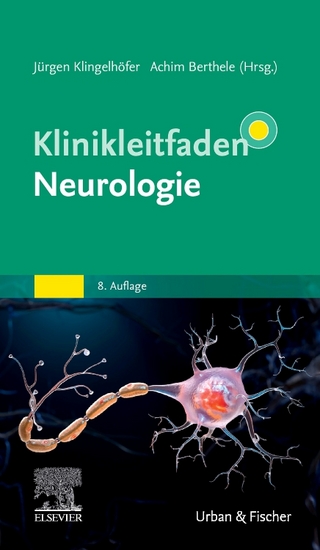
Handbook of Autism and Pervasive Developmental Disorders
John Wiley & Sons Inc (Verlag)
978-0-471-71697-6 (ISBN)
- Titel ist leider vergriffen;
keine Neuauflage - Artikel merken
The second edition of the benchmark reference Since its first edition, this handbook has become the most influential reference work in the field of autism and related conditions. Now expanded to two volumes, this comprehensive work provides a thorough review of these disorders, drawing on findings and clinical experience from a number of related disciplines. The Second Edition covers all current treatment models, and is updated to include new methods for screening and assessment, genetic components, and school-based interventions. All chapters have been thoroughly updated; two-thirds of chapters are entirely new to this edition. VolumeTwo includes the newest, most authoritative information available on assessment, interventions, and policy ramifications surrounding pervasive developmental disorders.
Fred R. Volkmar, MD is a child psychiatrist who trained at Stanford University and Yale. The Associate Editor of the Journal of Autism and Developmental Disorders and the Journal of Child Psychology and Psychiatry, he is a staff member of the Yale Child Study Center. Rhea Paul, PhD holds a joint appointment at Southern Connecticut State University, where she is Professor of Communication Disorders, and the Yale Child Study Center, where she pursues research on autism and related disabilities. Ami Klin, PhD is the Harris Associate Professor of Child Psychology and Psychiatry at the Yale Child Study Center. He obtained his PhD from the University of London. Donald J. Cohen, MD was founder of the renowned clinical and scientific research programs for Tourette's Syndrome at the Yale Child Study Center. Well known for his clinical expertise and breadth of understanding, Dr. Cohen served as Director of the Child Study center since 1983.
VOLUME 1: DIAGNOSIS, DEVELOPMENT, NEUROBIOLOGY, AND BEHAVIOR. SECTION I: DIAGNOSIS AND CLASSIFICATION. Chapter 1. Issues in the Classification of Autism and Related Conditions (Fred R. Volkmar and Ami Klin). Chapter 2. Epidemiological Studies of Pervasive Developmental Disorders (Eric Fombonne). Chapter 3. Childhood Disintegrative Disorder (Fred R. Volkmar, Kathy Koenig, and Matthew State). Chapter 4. Asperger Syndrome (Ami Klin, James McPartland, and Fred R. Volkmar). Chapter 5. Rett Syndrome: A Pervasive Developmental Disorder (Richard Van Acker, Jennifer A. Loncola, and Eryn Y. Van Acker). Chapter 6. Pervasive Developmental Disorder Not Otherwise Specified (Kenneth E. Towbin). Chapter 7. Outcomes in Autism Spectrum Disorders (Patricia Howlin). SECTION II: DEVELOPMENT AND BEHAVIOR. Chapter 8. Autism in Infancy and Early Childhood (Katarzyna Chawarska and Fred R. Volkmar). Chapter 9. The School-Age Child with an Autistic Spectrum Disorder (Katherine A. Loveland and Belgin Tunali-Kotoski). Chapter 10. Adolescents and Adults with Autism (Victoria Shea and Gary B. Mesibov). Chapter 11. Social Development in Autism (Alice S. Carter, Naomi Ornstein Davis, Ami Klin, and Fred R. Volkmar). Chapter 12. Language and Communication in Autism (Helen Tager-Flusberg, Rhea Paul, and Catherine Lord). Chapter 13. Neuropsychological Characteristics in Autism and Related Conditions (Katherine D. Tsatsanis). Chapter 14. Imitation and Play in Autism (Sally J. Rogers, Ian Cook, and Adrienne Meryl). Chapter 15. Autism and Emotion (Peter Hobson). SECTION III: NEUROLOGICAL AND MEDICAL ISSUES. Chapter 16. Genetic Influences and Autism (Michael Rutter). Chapter 17. Neurochemical Studies of Autism (George M. Anderson and Yoshihiko Hoshino). Chapter 18. Neurologic Aspects of Autism (Nancy J. Minshew, John A. Sweeney, Margaret L. Bauman, and Sara Jane Webb). Chapter 19. Functional Neuroimaging Studies of Autism Spectrum Disorders (Robert T. Schultz and Diana L. Robins). Chapter 20. Medical Aspects of Autism (Pauline A. Filipek). SECTION IV: THEORETICAL PERSPECTIVES. Chapter 21. Problems of Categorical Classification Systems (Lorna Wing). Chapter 22. Executive Functions (Sally Ozonof f, Mikle South, and Sherri Provencal). Chapter 23. Empathizing and Systemizing in Autism Spectrum Conditions (Simon Baron-Cohen, Sally Wheelwright, John Lawson, Richard Grif fin, Chris Ashwin, Jac Billington, and Bhismadev Chakrabarti). Chapter 24. The Weak Central Coherence Account of Autism (Francesca Happe). Chapter 25. Joint Attention and Neurodevelopmental Models of Autism (Peter Mundy and Courtney Burnette). Chapter 26. The Enactive Mind-From Actions to Cognition: Lessons from Autism (Ami Klin, Warren Jones, Robert T. Schultz, and Fred R. Volkmar). Author Index. Subject Index. VOLUME 2: ASSESSMENT, INTERVENTIONS, AND POLICY. SECTION V: ASSESSMENT. Chapter 27. Screening for Autism in Young Children (Elaine E. Coonrod and Wendy L. Stone). Chapter 28. Diagnostic Instruments in Autistic Spectrum Disorders (Catherine Lord and Christina Corsello). Chapter 29. Clinical Evaluation in Autism Spectrum Disorders: Psychological Assessment within a Transdisciplinary Framework (Ami Klin, Celine Saulnier, Katherine Tsatsanis, and Fred R. Volkmar). Chapter 30. Assessing Communication in Autism Spectrum Disorders (Rhea Paul). Chapter 31. Behavioral Assessment of Individuals with Autism: A Functional Ecological Approach (Michael D. Powers). Chapter 32. Sensory and Motor Features in Autism: Assessment and Intervention (Grace T. Baranek, L. Diane Parham, and James W. Bodfish). SECTION VI: INTERVENTIONS. Chapter 33. Curriculum and Classroom Structure (J. Gregory Olley). Chapter 34. Behavioral Interventions to Promote Learning in Individuals with Autism (Laura Schreibman and Brooke Ingersoll). Chapter 35. Behavioral Interventions (Joel D. Bregman, Dianne Zager, and John Gerdtz). Chapter 36. Critical Issues in Enhancing Communication Abilities for Persons with Autism Spectrum Disorders (Barry M. Prizant and Amy M. Wetherby). Chapter 37. Enhancing Early Language in Children with Autism Spectrum Disorders (Rhea Paul and Dean Sutherland). Chapter 38. Addressing Social Communication Skills in Individuals with High-Functioning Autism and Asperger Syndrome: Critical Priorities in Educational Programming (Wendy D. Marans, Emily Rubin, and Amy Laurent). Chapter 39. School-Based Programs (Joel R. Arick, David A. Krug, Ann Fullerton, Lauren Loos, and Ruth Falco). Chapter 40. Helping Children with Autism Enter the Mainstream (Jan S. Handleman, Sandra L. Harris, and Megan P. Martins). Chapter 41. Models of Educational Intervention for Students with Autism: Home, Center, and School-Based Programming (Sandra L. Harris, Jan S. Handleman, and Heather K. Jennett). Chapter 42. Working with Families (Lee M. Marcus, Linda J. Kunce, and Eric Schopler). Chapter 43. Employment: Options and Issues for Adolescents and Adults with Autism Spectrum Disorders (Peter F. Gerhardt and David L.. Holmes). Chapter 44. Psychopharmacology (Lawrence Scahill and Andres Martin). SECTION VII: PUBLIC POLICY PERSPECTIVES. Chapter 45. Preparation of Autism Specialists (Gail G. McGee and Michael J. Morrier). Chapter 46. Educating Children with Autism: Current Legal Issues (Myrna R. Mandlawitz). Chapter 47. Cross-Cultural Program Priorities and Reclassification of Outcome Research Methods (Eric Schopler). SECTION VIII: INTERNATIONAL PERSPECTIVES. Chapter 48. International Perspectives (Fred R. Volkmar). SECTION IX: PERSONAL PERSPECTIVES. Chapter 49. Community-Integrated Residential Services for Adults with Autism: A Working Model (Based on a Mother's Odyssey) (Ruth Christ Sullivan). Chapter 50. A Sibling's Perspective on Autism (Jason B. Konidaris). Chapter 51. A Personal Perspective of Autism (Temple Grandin). Chapter 52. A Teacher's Perspective: Adult Outcomes (Virginia Walker Sperry). Chapter 53. Autism: Where We Have Been, Where We Are Going (Isabelle Rapin). Author Index. Subject Index.
| Erscheint lt. Verlag | 27.5.2005 |
|---|---|
| Zusatzinfo | Illustrations, ports. |
| Verlagsort | New York |
| Sprache | englisch |
| Maße | 183 x 252 mm |
| Gewicht | 1330 g |
| Themenwelt | Medizin / Pharmazie ► Medizinische Fachgebiete ► Neurologie |
| ISBN-10 | 0-471-71697-9 / 0471716979 |
| ISBN-13 | 978-0-471-71697-6 / 9780471716976 |
| Zustand | Neuware |
| Haben Sie eine Frage zum Produkt? |
aus dem Bereich



